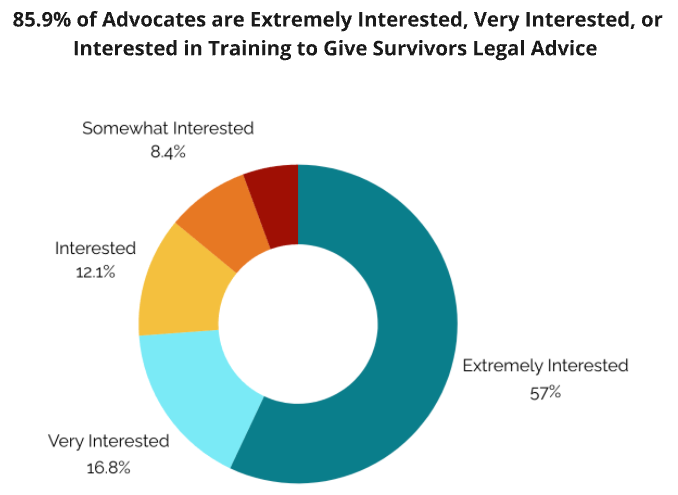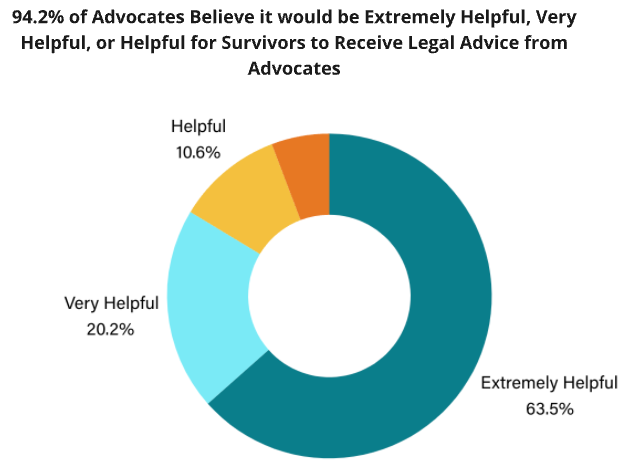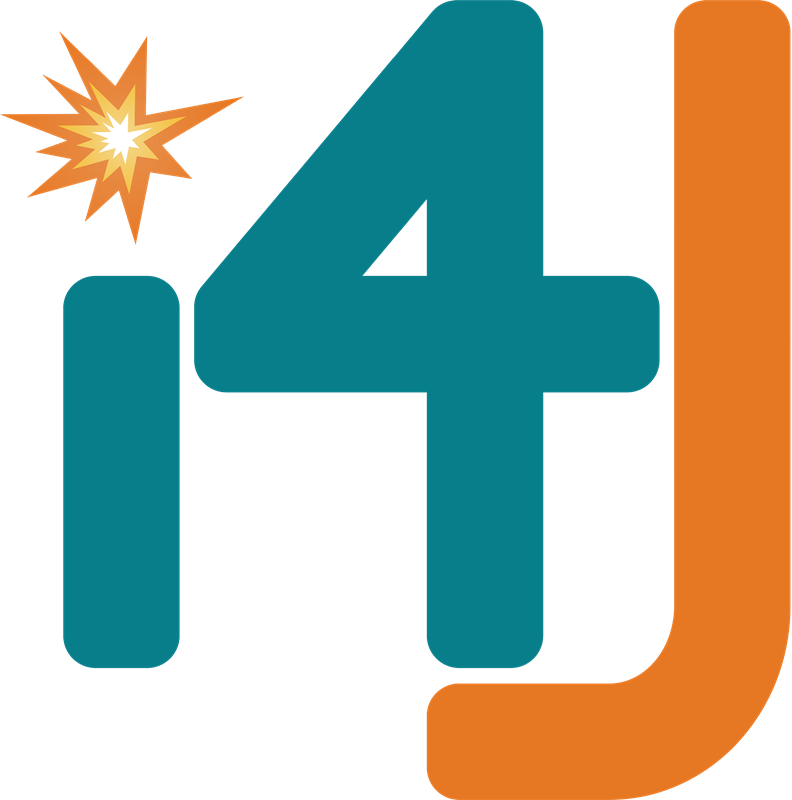Do DV advocates think UPL reform and the ability to give limited-scope legal advice as part of their services would be helpful to them and the survivors they serve?
DV advocates are extremely interested in providing legal advice to survivors.
The overwhelming majority of advocates interviewed are extremely interested or very interested in opportunities to expand their role to include limited-scope legal advice as a service to the survivors they work with.

“I can’t even…put into words how exciting that option would be [to give legal advice to survivors].”
– Advocate from the Midwest
“I would love to [give legal advice] if I had the opportunity, if I could.”
– Advocate from the West
“I think it would just very nicely round out our advocate role.”
– Advocate from the West
DV advocates think that it would be extremely helpful for survivors to receive legal advice from advocates.
The overwhelming majority of advocates and organization leaders believe that survivors would benefit from advocates being authorized to give legal advice.

Allowing DV advocates to give legal advice through a certification process would allow the advocates to more easily meet the needs of DV survivors.
Survivors are already asking advocates legal questions, but awareness of UPL restrictions prevents advocates from giving survivors more than information about their options. This presents challenges because many survivors are in crisis, which impacts their decision-making abilities. Advocates see the ability to give legal advice as a pathway to meeting the survivor’s needs in the moment, rather than running the risk of overwhelming them with options, leaving the survivor with more questions than answers.
“It would be magnificent for me to pick up the phone and be able to help a person entirely in that phone call instead of traumatizing them further by sending them elsewhere for them to start all over again.”
– Advocate from the West
“[Being able to provide legal advice] would just be awesome to be able to tell someone, ‘Hey, like I can genuinely help…[and] not [in] a hypothetical way.”
– Advocate from the Midwest
“[Providing legal advice] add[s]…easier access to the legal system.”
– Advocate from the Northeast
“[Providing legal advice] provide[s] an extra layer of services and support for a survivor.”
– Advocate from the Northeast
Advocates want to be sure that they are properly trained to provide legal advice.
Advocates see training as the key to lowering liability risk if legal advice is included in their services. With proper training, advocates feel they can adequately assist survivors with their ongoing civil legal needs.
“I would definitely want [the ability to give legal advice] to come…with a good, comprehensive training so that I would know what I’m saying.”
– Advocate from the Midwest
“[To be able to give legal advice I] would like to have extra knowledge.”
– Advocate from the Northeast
“[I would need training] to understand the process and legal requirements to give appropriate advice regarding evidence and options.”
– Advocate from the West
“The biggest concern everyone always has, myself included, is the liability issues.”
– Advocate from the West
Knowing more about the law can protect advocates, allow advocates to learn more, and help the advocates feel more comfortable working with legal issues.
Advocates view additional training to provide legal help and advice as a way to protect themselves in their work.
“Having a little bit of legal knowledge also helps protect us and helps protect the organization.”
– Advocate from the West
“I feel like the more training and knowledge that you have, the more power you have.”
– Advocate from the West
“I’d be able to immediately at the time of, you know, [the] court case, be able to, you know, with more certainty, say…what’s happening, or…what could happen, or what she could ask for.”
– Advocate from the Northeast
Advocates are concerned that the training, certification, and provision of legal services would add to their already heavy workload.
Advocates are already tasked with many different jobs. Many advocates voiced concern that being trained to provide legal advice would increase an already large workload.
“[Advocates] don’t have the time to dedicate four weeks to [training] right now.”
– Advocate from the West
“I’ve been doing this for seven years, and I’m still learning new information through this, like training that I’m currently in. And there’s a lot of responsibility there…it’s like asking a lot from advocates to be experts and everything.”
– Advocate from the Midwest
“I don’t know that I have a lot of interest in wanting to do that just because of my concerns, like the concerns that I have for myself trying to practice law in any way would be the same concerns I have for the clients I support.”
– Advocate from the South
“You’re messing with people’s lives, big time. And I know in general and advocacy we always are. But when it comes to like…legal actions and your legal rights, and whether or not your children live with you, or live with the abuser till they’re 18. That is a huge responsibility.”
– Advocate from the Northwest
A way to mitigate concerns about workload would be for advocates’ workplace benefits and compensation to match the increase in responsibilities associated with giving limited-scope legal advice.
DV advocacy already has a high rate of turnover and burnout, not factoring in additional responsibility. DV advocacy organizations and advocates themselves may need to utilize workplace benefits and increased compensation in order to mitigate the increased potential for burnout as a result of increased responsibility.
“I think a lot of times given just the work, there’s a large turnover rate.”
– Advocate from the West
“I have no interest in giving legal advice unless it comes with a…significant pay raise to reflect that.”
– Advocate from the Midwest
“Why would I sign up to do more work and have more expectation if I’m not getting paid more?”
– Advocate from the Midwest
Organization leaders support their advocates providing limited-scope legal advice to the survivors that they serve because they believe it would be valuable to their organization and its clients.
Organization leadership reports that the biggest complaint they receive from survivors is that they are unable to consistently connect with attorneys, if at all. Organization leadership supports advocate training and authorization to provide legal advice to better meet survivors’ needs. Organization leaders acknowledge that allowing advocates to provide limited-scope legal advice would free up attorneys to take on the more complex cases.
“I think it [advocates providing legal advice] would be extremely helpful [to the survivors we serve].”
– Organization Leader from the Northeast
“Because the resources are so limited, [allowing advocates to give legal advice] would obviously…expand access [to the legal system] for people.”
– Organization Leader from the Northwest
“At the end of the day, if you can help somebody and have additional training and be able to do that, why not do it?”
– Organization Leader from the South
“By no means is every civil legal thing that comes in front of them something that requires an attorney.”
– Organization Leader from the Northwest
“Survivors tend to trust advocates more than other legal professionals and have better working relationship[s] which leads to better communication and understanding about the individual needs of survivors.”
– Organization Leader from the Midwest
“There are many questions that advocates receive on a daily basis that they know the answer to, but cannot provide [to survivors]. Saving survivors the cost and time involved in obtaining all legal advice from an attorney is exciting and could make a real difference in their safety.”
– Organization Leader from the Midwest
“Our advocates are in court so often with survivors that they pick up on trends and subjective preferences or styles of different judges/courts. They could provide some insights to a survivor prior to walking in for a hearing that could help the survivor feel more prepared and less anxious.”
– Organization Leader from the Midwest
“Being able to provide information that is well known to a legal advocate that would be beneficial to a client’s case. We would be able to guide survivors in a time where they feel very lost.”
– Organization Leader from the Midwest
Organization leaders want to be involved in decisions regarding certification processes and scope of service for advocates providing legal advice.
When considering if advocates should provide limited-scope legal advice to survivors, organization leadership’s main concerns surround the training process and the boundaries that would need to be created. To mitigate these concerns, organization leaders want advocates to undergo proper training to limit liability and fully understand their scope of service.
“[I want to] be able to spend time with the staff [to really make] sure that they understand how to apply [the training] and what those limits are before [giving legal advice.]”
– Organization Leader from the Northwest
“The organization would need to have some kind of accreditation process or at least an attorney on staff that could supervise the advocates and could be kind of that, that fall back.”
– Organization Leader from the South
Advocates each come with unique backgrounds, approaches, and experience levels; not all advocates will be well-suited for providing legal advice.
Advocates acknowledge that there is a wide range of educational experiences, backgrounds, approaches, and direct experience levels that advocates have. Some advocates are well-positioned to successfully provide legal advice while others are not. This leads some organization leaders to want some decision-making discretion regarding which advocates can be authorized to provide legal advice because of varying skill, quality, and experience levels.
“Not all advocates are made the same.”
– Advocate from the West
“Some advocates just aren’t great and would give support that’s just, not great.”
– Advocate from the West
“You can always run into a person who’s more reckless in giving that advice.”
– Advocate from the Midwest
“I also know some really bad advocates that I would be like, would I trust them? I don’t know.”
– Advocate from the Northwest
Organization leaders want there to be clear boundaries for the scope of service authorized to ensure that advocates understand and are able to effectively communicate those boundaries to survivors and other actors in the civil justice problem-solving ecosystem.
Organization leaders expressed concern that survivors might be unsure about the scope of legal services and what problems advocates are authorized to help with. This may lead survivors to become frustrated if an advocate could help them with one legal issue but not another.
“My biggest concern is the misunderstanding and misconception of survivors thinking well, you can tell me this, why can’t you tell me more.”
– Organization Leader from the Midwest
“[Advocates need to] mak[e] sure that whatever was told [to a survivor] was documented, really well.”
– Organization Leader from the Northwest
“[I think advocates giving legal advice is a good idea but I’m] not so sure that the legal team would actually agree.”
– Organization Leader from the South
“The pushback that we would anticipate would be from the private lawyer.”
– Organization Leader from the Northwest
